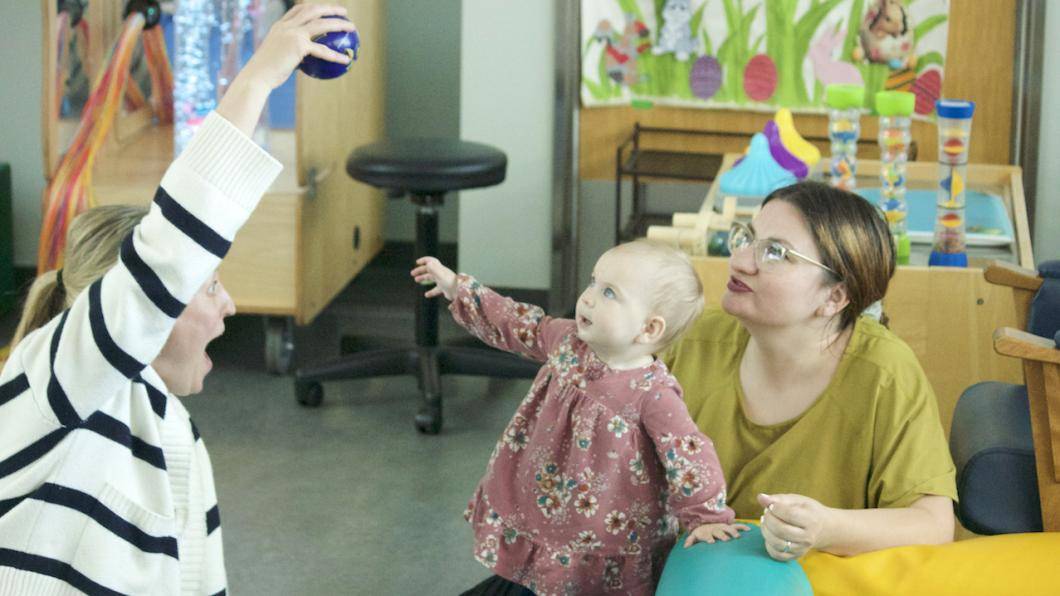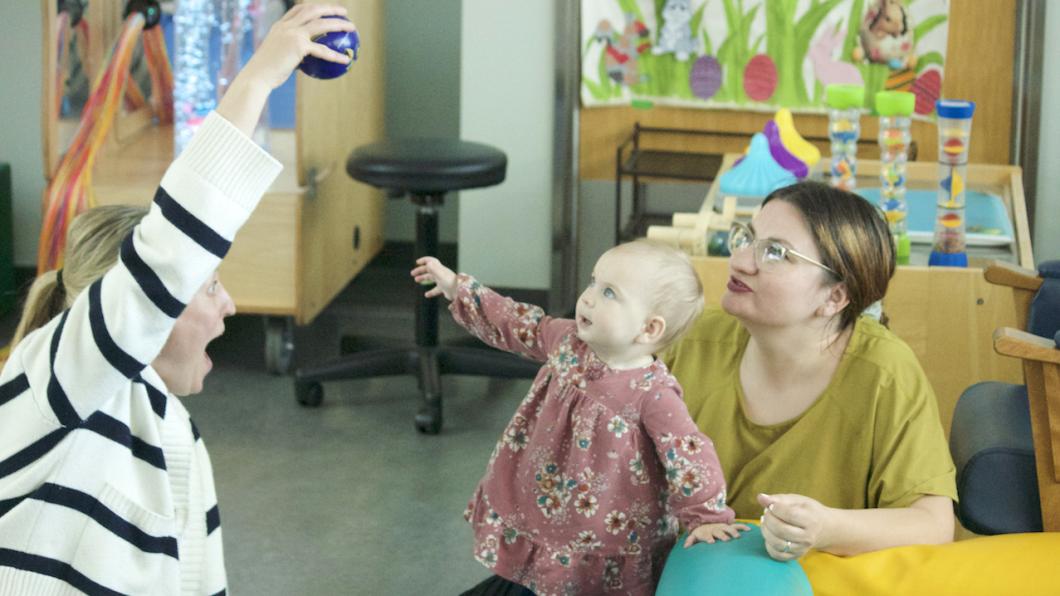Helping parents read their baby’s cues


By Louise Kinross
Erin Dowds helps parents connect with babies who show signs of autism.
The early childhood educator and researcher at Holland Bloorview is adapting the Social ABCs—a program where parents are coached to read their toddler’s social cues and engage them through play—for babies aged six to 15 months.
“It’s about helping the parent and baby appreciate the way each other sees the world,” Erin says. “Autistic kids have a special way of offering you a cue. From their point of view, it’s really clear, but it may be difficult for a parent to read. For example, I might see a little one holding a toy car they really like up in the air. They’re showing their parent: ‘Hey, look at this cool toy.’”
But the parent who expects the baby to look directly at them misses the cue.
“I want that parent to bring their body around into the best face-to-face position so the baby has the opportunity to notice the smiling parent and they can enjoy the car together. Then the baby notices ‘Mom is smiling when I show them the toy’ and that feels good.”
A 2017 randomized control trial found toddlers with emerging or diagnosed autism who participated in the Social ABCs saw gains in their vocal responses to parents, in initiating vocalizations, and in shared smiling between parent and child. The trial was led by Jessica Brian, a psychologist and co-lead of the Autism Research Centre at Holland Bloorview who co-developed the Social ABCs. The program for toddlers is now offered in a number of provinces and other countries.
Erin is working on a curriculum for younger babies and delivering a pilot 12-week program to mom-and-baby pairs over Zoom. There are two 30-to-40 minute sessions a week for the first three weeks, and then weekly sessions following that.
Based on a baby’s interests, the parent engages the child in a playful routine like bubble blowing or peekaboo. The goal is to create communication opportunities and respond to all direct attempts from the baby. That could be leaning in to the play, looking, reaching or making a sound. “This isn’t about trying to get kids to talk,” Erin says. “We’re clear about that with parents. It’s about an ability to connect with a partner and share positive feelings together.”
Erin just completed her doctorate in child study and education, a new degree program at the Ontario Institute for Studies in Education at the University of Toronto. She is their first graduate.
“I don’t think I’ve ever not been in this field,” Erin says, noting that she has a “neurodiverse family.” Her work has always involved children with autism and their parents. Erin was a one-to-one camp support worker as a teen. She studied early childhood education while working as a preschool teacher, then became a resource consultant working with kids with disabilities in home, school and childcare settings.
“I want to support families during that intense experience of a new diagnosis and the whole journey leading up to and after it,” Erin says. “It became my passion.”
The greatest challenge of her current role is “validating the feelings of parents and at the same time helping them celebrate their baby.”
Often parents’ concerns about their child have been dismissed by family, daycare workers or family doctors. “It can cause a lot of distress,” Erin says. “Moms start worrying that they’re concerned about things that aren’t happening, or that they know these things are happening and no one else sees them. They may say things like: ‘He doesn’t like to look at me. I’m not his favourite thing.’”
Focusing on what their baby isn’t doing means parents “may miss some of the wonderful things that are happening with their child’s development,” Erin says. Part of her role as coach is to observe and point out all of the baby’s strengths. For example: “Oh my gosh! Look what he just did there. He put his hand on the table and was trying to pull to stand. What a cheeky monkey!”
“Good self-regulation” is critical to coaching, Erin says. Parents, who may be stressed and emotional, “need you to partner with them in a calm way that says: ‘We’re in this together and I’m here for you.’” Erin, who enjoys yoga, maintains a calm breath during sessions and works on keeping a soothing tone of voice.
“I use a slow rate of speech and don’t use jargon,” Erin says. “I provide in-the-moment, step by step guidance that moves the parent and baby toward an interaction that feels successful and satisfying for the pair. I want to help parents feel strong and skilled. I’m the voice in a parent’s ear saying ‘You can do this.’”
Erin says long-distance running and swimming put her “in a nice meditative state” that is great for managing stress.
Supporting her sister Melanie, whose daughter Emersyn died from spinal muscular atrophy, helped Erin learn to be emotionally present with people during the most challenging circumstances. “I am quite comfortable in messy situations where there is no right or wrong answer,” she says. “I approach life on a day-to-day basis, which I think is helpful when supporting families living with uncertainty.”
Erin finds “so many joys” in her work. “I feel so passionately about being with parents during this vulnerable time,” she says. “I get so much satisfaction when I see them getting things back from their child: ‘Oh my gosh, he’s smiling at me. He’s never done that before. Did you see that?’ We’ve had so many babies take their first steps during sessions. The parents are so committed, and they really let you in to their life. I feel very protective of these families.”
So far Erin has worked with eight pairs of moms and babies. Her hypothesis is that the 12-week program will increase the number of times a baby looks to their parent’s face during a play session, and that this may lead to more shared smiles and direct communication. That will be determined when the sample size is much larger.
Jessica’s Infant Social ABCs research is funded by Women and Children’s Health Research Institute Stollery Science Lab under Dr. Lonnie Zwaigenbaum’s Distinguished Researcher Program.
To learn more about the pilot Social ABCs program for babies showing signs of autism, e-mail Erin at edowds@hollandbloorview.ca. Like this content? Sign up for our monthly BLOOM e-letter, follow @LouiseKinross on Twitter, or watch our A Family Like Mine video series.
















Leave a comment